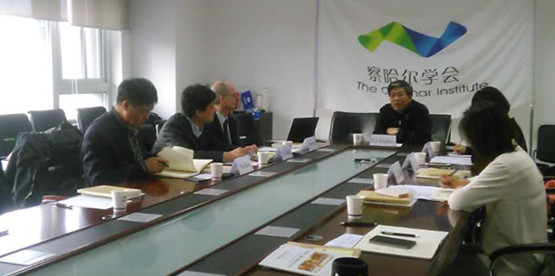Think tank urges conflict resolution for Belt and Road
- By Chen Boyuan
 0 Comment(s)
0 Comment(s) Print
Print E-mail China.org.cn, November 4, 2015
E-mail China.org.cn, November 4, 2015
|
|
|
The Charhar Institute Roundtable for Conflict Resolution for the Belt and Road was held on Tuesday in Beijing. [Photo: charhar.org.cn] |
Potential conflicts along the "Belt and Road" tend to be neglected compared with the concept of common prosperity promised to all countries involved in this transnational development project.
Although financial, business and technical issues are central to the "Belt and Road," security issues are also important because conflicts and instability offset development, especially when the "Belt and Road Initiative" stimulates new social changes and challenges.
The "Belt and Road" stretches along the areas where most current conflicts are taking place. Central Asia, Eastern Europe and the Middle East on the Silk Road Economic Belt and Southeast Asia and the Horn of Africa on the 21st Century Maritime Silk Road are hot with various conflicts that ranged from territorial disputes to terrorist threats and religious wars.
Apart from national and state factors, non-state factors, religious and terrorist factors are on the rise in the current conflicts along the "Belt and Road," according to Dr. Alan Hunter, professor of Asian Studies at Coventry University, UK who attended the Charhar Institute Roundtable for Conflict Resolution for the Belt and Road on Tuesday in Beijing.
Laying out the "Belt and Road Initiative" on these regions means that China will have a higher risk of getting involved in such conflicts as the Initiative continues to unveil and transform into concrete development plans with respective countries.
The increasing risk of conflict involvement that China faces is not because China will become part of the conflicts but that China's expanding global presence, boosted by the "Belt and Road Initiative," will mire China in those conflicts.
"In other words, China is not creating problems but entering regions with chronical problems," said Hunter.
Regions having such "chronical problems" along the "Belt and Road" might start conflicts due to different religions, beliefs and social norms, but "peace is a common aspiration," said Hunter.
Hunter mentioned that China successfully pulled out its citizens from Libya and Egypt when internal wars broke out in those countries, which reflected China's maturing emergency response in terms of protecting its interests, including the lives of its overseas citizens. From another perspective, these evacuations showed that China's interest will be affected by conflicts taking place elsewhere.
As Chinese people become more educated and get richer, China's resolution to help with the world peace is also growing accordingly.
Chinese President Xi Jinping restated China's commitment to peace at the UN Peacekeeping Summit on Sept. 28. He announced a series of major contributions to UN peacekeeping and other actions, noting that China will play a more active role in contributing to world peace.
While the U.S.-led West has interpreted China's increasing responsibility in the UN peacekeeping mission as a reflection of its ambitions for a stronger global presence, Hunter said it is easier to say that China has had peaceful traditions. Since the end of World War II and the Korean War, China has remained peaceful with other countries except for small scale conflicts with India and Vietnam. By contrast, the United States, the self-proclaimed largest peace advocate in the world, has been mired in countless wars.
Prof. Yu Wanli, a senior research fellow at the Charhar Institute, suggested that within the "Belt and Road" framework, China should gradually help with other countries' "governance, instead of government" in terms of jointly boosting peace and security.
"We won't interfere with whoever is in power; instead, we should help other countries establish and improve public services, such as education and health systems," said Yu, explaining how "governance and government" are different in this sense.




Go to Forum >>0 Comment(s)